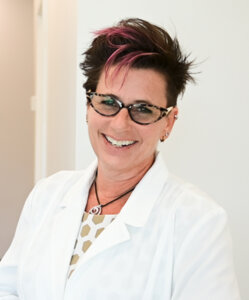 Q&A with Dr. med. Tanja Ebanks, General Surgeon at Cayman Surgery.
Q&A with Dr. med. Tanja Ebanks, General Surgeon at Cayman Surgery.
Why did you move to Cayman?
I always knew I was going to be living in a warm country once I finished Med school. I was going to move to Queensland Australia, but then met my husband on vacation here in 1996 and the rest is history.
What should we know about your medical expertise and experience?
All my medical training was in Switzerland and most of my surgical residency was in Switzerland. In 1999 my husband and I went to Western Samoa, where I worked as a surgical registrar. That was a very interesting and educational year. I did two years of hand and plastic surgery during my residency where I first was introduced to breast reconstruction amongst other plastic and microsurgical procedures. After moving to Cayman in 2005 I have been dealing with breast problems and managing breast cancer more and more, probably as I am the only female surgeon. Currently, over 50% of my practice is breast-related.
Any advice for someone recently diagnosed with breast cancer?
Most patients these days are diagnosed early unless symptoms have been ignored for a long time or screening has been missed for years. Having been diagnosed early means for almost all the patients we can help you cure the cancer and even though you might have a few months or a year with treatment ahead of you, you will most likely have a happy long life afterwards.
Tell us more about one particular procedure.
Sentinel lymph node biopsy. That is the procedure where only one or very few lymph nodes are removed in your armpit during your cancer surgery. There are several imaging modalities available in Cayman now, that help us find the correct (=sentinel) lymph node that needs to be removed.
Why will it benefit breast cancer patients?
Removing fewer lymph nodes means less pain, less morbidity, and less risk of lymphedema (chronic pain and swelling in the arm).
What is your medical opinion on Lumpectomy vs Mastectomy (what should our breast cancer thrivers consider)?
Not everyone is a candidate for lumpectomy, but if your surgeon offers you a lumpectomy, the decision lies with the patient. As long as you are doing radiation after lumpectomy your overall survival is no different. Also, doing a mastectomy unfortunately does not mean that the cancer cannot come back on that same side. Even though the local recurrence risk is smaller with mastectomy than with lumpectomy, if you are doing your clinical checks and imaging as suggested by your breast surgeon after lumpectomy, you very likely will have to get a mastectomy at that time of local recurrence, it is unlikely cancer has spread somewhere else – meaning again, you would be able to enjoy a happy long life afterward.
What’s your guidance on breast preservation?
If you are a candidate for breast conservation, it is the option with the least surgical complications and quickest recovery, but as mentioned above, you will need radiation afterward. You will also need to follow up diligently afterward and not miss your clinical exams and imaging.
Tell us something interesting about you.
I always wanted to become a plastic surgeon from when I was a teenager, but after the year in Samoa and the two years of hand and plastic surgery, I knew I would not be happy to mostly deal with cosmetic patients, as much as I loved the microsurgical procedures. I therefore turned down the continuation of my plastic surgery residency program at the University Hospital and became a general surgeon. I am very happy that I am now able to help people with their breast cancer and work together with plastic surgeon Dr. Dancey, who is amazing in helping our breast cancer patients with their reconstruction.